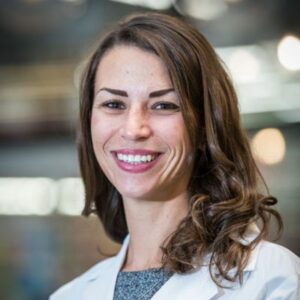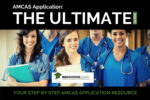
Table of Contents
The extracurriculars you choose and the experience they provide are one of the most important parts of your medical school application. These experiences should help you demonstrate the AAMC’s 17 pre-med competencies.
I’m Dr. Renee Marinelli — I’m a first-generation college student who has served on AdComs in Hawaii and California, and I’m now the Director of Advising at MedSchoolCoach. Below, I explain the benefits of the best extracurricular activities for pre-meds, which ones look better on your application, and so much more.
Keep reading to learn my top tips on choosing the right extracurriculars for your med school application.
Visit our Pre-Med Extracurricular Portal to browse and apply to multiple volunteering, clinical, and leadership experiences all in one place. Get involved with the Red Cross, American Heart Association, ProScribe, and more.
How Many Extracurricular Hours Do You Need for Medical School?
The number of extracurricular hours you need for medical school applications (for the Work & Activities section) can vary. But I have found the following minimums are a good rule of thumb:
- 30 hours of shadowing experience with 3 different physicians
- 150 hours of volunteering experience
- 150 hours of clinical experience
- 100 hours of leadership experience
- 0 hours of research experience (!)
You might be wondering, “Does this mean I don’t need research experience?”
The answer is, it depends! Some medical schools don’t require any research experience whatsoever. For other schools, especially the prestigious ones, you’ll need hundreds of hours or research (or more) to have a chance.
It’s important to understand the numbers above are just the bare minimum requirements that you’ll need to be considered at even the least selective of US medical schools. That doesn’t mean they’re enough to get you into where you want to go. If you want a strong application, I suggest you shoot for numbers in this range:
- 50-100 hours of shadowing experiences with 5+ different physicians
- 300+ hours of volunteering experience
- 300+ hours of clinical experience
- 100+ hours of leadership experience
- 400+ hours of research experience
In general, more is better than less, although there are diminishing returns in some categories. Also, the quality of your extracurricular activities is more important than the quantity. Admissions committees are looking for applicants who have actively pursued their passions while demonstrating leadership, teamwork, and commitment.
Read Next: How Can I Help My Kid Get Into Medical School?
In general, it’s a good idea to have a well-rounded AACOMAS, TMDSAS, or AMCAS application that demonstrates your commitment to both academics and non-academic pursuits. Prioritize long-term activities over week-long trips or one-time experiences.
Ultimately, the most important thing is to be honest and genuine in your application. Focus on highlighting the experiences that are truly meaningful to you and that demonstrate your potential as a future medical professional.
Feel free to go over the above minimums.
Shadowing
Physician shadowing is a valuable extracurricular activity that lets pre-med students gain first-hand exposure to the daily work of a physician. During a shadowing experience, students have the chance to observe and assist with patient care, as well as interact with working healthcare professionals.
Shadowing can help students to make connections and earn letters of recommendation from physicians, which helps in the medical school application process. While there is no specific number of hours of shadowing that you need for medical school, I recommend getting at least 30 hours with three physicians in three different specialties. To be competitive, however, I would aim for 50+ hours with five physicians in five different specialities.
Unlike the other extracurricular categories, you can overdo shadowing. In general, logging more than 100 hours of shadowing is unnecessary — in fact, it may raise some eyebrows as to why you weren’t using that time to pursue more hands-on activities.
If you are interested in shadowing, start reaching out to doctors in your network to ask if they’d let you observe them at work. You can also check with your school’s career center or medical school advisors to see if they have any resources or connections to help you find shadowing opportunities.
MedSchoolCoach offers free virtual shadowing opportunities to let you experience a day in the life of physicians in nearly every specialty.
International opportunities like Global Brigades are a great way to get a lot of shadowing — not to mention leadership experience — in a short amount of time.
Read More: 10 Questions to Ask When Shadowing a Doctor
Shadowing is simply observing a physician. Clinical experience refers to hands-on experiences, such as checking vital signs, maintaining a clean environment, and drawing blood samples. Some experiences allow you to do both.
They both are! Shadowing is one way to begin the process of familiarizing yourself with the medical field, while clinical experience helps you begin to develop a feel for patient rapport.
Shadowing is one category in the Work & Activities section, and clinical experiences are divided into two categories: “Community Service/Volunteer – Medical/Clinical” and “Paid Employment – Medical/Clinical.” As a former admissions officer, I would recommend prioritizing the category of paid or volunteer clinical experience over shadowing when adding experiences where you both observed and got hands-on experience to your AMCAS, TMDSAS, or AACOMAS applications.
No, admissions committees nor your medical school instructors will expect or even want you to have selected a specialty before getting started. Shadowing is a great way to become familiar with the various specialties, but your rotations during medical school will likely be much more significant in the process of choosing the specialties you apply to for residency.
Research
Research opportunities show schools you are an academic thinker and are interested in advancing the field of medicine.
It’s possible to get into some medical schools without research experience. However, at some medical schools, especially the prestigious ones, having no research experience is an automatic dealbreaker.
The AAMC doesn’t publish numbers on average research hours for matriculants, but our advisors typically recommend you have a minimum of 400 hours of research experience if you’re planning to apply to research-focused schools like Johns Hopkins, Harvard, and WashU in St. Louis.
If you’re looking to complete an MD-PhD program, it’s a whole different story. These programs typically expect to see at least 1,500 hours of research, more if possible. The MD-PhD program at University of Michigan, for instance, recommends that applicants work in a lab for at least two summers full-time and one academic year part-time.
Also, remember that the quality of your research hours may matter more than the quantity. In general, you want something to show for your time spent researching — a poster, presentation, or even a publication will really help your application. Prospective MD-PhD students should aim for a publication as first, second, or third author to really maximize their chances.
have any publications when they enter med school. However, for top-tier schools, I’d say about half of competitive applicants have at least one publication under their belt. After you’re accepted, expect more opportunities to get published. On average, US medical students have 14 publications before graduating, but that number can be as high as 80 at top-tier, research-heavy schools.
There are no ‘requirements’ for a minimum number of research hours that you need to apply to most medical programs. However, if you’re considering research-focused medical schools, 400 hours is a great place to start. MD-PhD applicants should aim to get 1,500 or more.
Look for a frequently-published lab that is accepting new workers, interns, etc. You might ask your pre-med advisor for resources or connections. You can look online in your area, or ask around at the local hospitals and physician offices, especially if you have a teaching hospital nearby. You should definitely talk to the teaching hospital to see if there’s any clinical research opportunities. There are many websites that cater specifically to students looking for research experiences, such as the National Science Foundation’s Research Experience for Undergraduates (REU) program.
Learn expert tips for making the most of research during pre-med with our FREE Research Roadmap video course!
Leadership
Leadership activities can demonstrate to admissions boards that you have the leadership ability needed to succeed as a doctor. You should aim to get at least 100 hours of experience in this category.
Through leadership experiences, you can show that you are passionate and dedicated to causes important to the field of medicine, such as community service, organizing fundraisers, or leading an extracurricular group on campus.
LISTEN: Leadership & Coaching with Dr. Pamela Ludmer
You can also build relationships with healthcare professionals and observe their experiences in health systems through these leadership opportunities. These leadership skills should boost your resume, communication skills, and hopefully your exposure to healthy work-life balance.
There are many ways for a pre-med student to gain leadership experience. Here are a few ideas:
- Join a student organization or club and work your way up to a leadership position. The best pre-med clubs include Global Medical Brigades, Biology Club, Anatomy Club, AMSA, and AED.
- Take on a leadership role in a volunteer organization.
- Start your own project, non-profit, or initiative.
- Participate in leadership development programs.
You can work your way up to a leadership position in a student organization or volunteer group. You can start a Global Medical Brigades chapter on your campus and serve as Chapter President. You could start your own nonprofit or community project. I would consider participating in a structured leadership development program.
Any experience — medical or non-medical — where you exhibited leadership can count as leadership experience. It helps if you held an official leadership role, but a title is not necessary.
Volunteering
Volunteer service is a great way to demonstrate your commitment to medicine and passion for serving others. Depending on how these volunteer experiences are presented, they can also provide insight into a candidate’s professional capabilities and personal goals.
Some medical schools may require a minimum number of volunteer hours. I recommend a minimum of 150 volunteer hours, but 300 hours or more will give you the best chances of acceptance.
International volunteering is fantastic, as long as you ensure it is sustainable (another shout-out to Global Medical Brigades). Also, avoid white saviorism. Use empowering language when discussing your volunteer work.
Also remember that there’s technically two categories for volunteering on the AMCAS application: Medical/Clinical and Not Medical/Clinical. Don’t log 300 hours in the Medical/Clinical Volunteering section and expect that to cover both your clinical and your volunteering requirement. If you have significant Medical/Clinical volunteering experience, AdComs will probably also want to see an additional volunteering experience to round your application out, preferably one involving underserved groups.
I always recommend that students have at least one solid Non Medical/Clinical volunteering experience to put on their application. This might involve starting your own non-profit or helping at an assisted living facility or food pantry. Whatever activity you choose, it should aim to serve underprivileged groups.
I would discourage listing any trips that could be construed as “medical tourism” on your application. In general, international volunteering can be great, but focus strongly on sustainably designed organizations. Volunteering trips with a religious focus are acceptable, as long as they are balanced with other activities. Also, be careful with your language. You can make any volunteering look bad if you the wrong words on your application — for instance, it is generally acceptable to use the term “people of color” over “minorities” and “underprivileged” over “struggling” or “needy.
Interested in understanding what an admissions committee is looking for from its applicants when it comes to extracurricular activities? MedSchoolCoach recently held a webinar on the topic!
Patient Exposure/Clinical Experience
Clinical experience differs from shadowing because it is hands-on – it must involve you interacting with patients as a healthcare provider of some kind.
In general, this type of hands-on experience is more important for your application than shadowing and observerships because it exposes you directly to patient care and gives you a better idea of what goes into making clinical decisions.
That’s not to say physician shadowing isn’t important – it is, and AdComs will definitely want to see it on your application. However, they will also want to see clinical experience, and lots of it. In general, you should aim for at least 300 hours in this category.
If you’re unsure where to find patient exposure, here are 10 places you can turn to:
- Emergency medical services: Pre-meds can gain valuable clinical experience by getting their EMT and Basic Life Support (BLS) certification, which opens the door to working at private ambulance services, on-campus EMS, and even certain fire departments.
- ER Technician: Those who have earned their EMT certification can also find employment in emergency rooms as ER Technicians. This role involves taking patient vitals, assisting nurses and physicians with procedures, performing CPR, etc.
- Medical scribing: Apply to an organization like ProScribe to get trained and employed as a medical scribe. This counts as clinical experience because as a scribe, you’ll be part of a healthcare team.
- Certified Nursing Assistant (CNA): Many pre-meds complete training programs to become certified nursing assistants or certified nurse aids. CNAs help doctors and nurses provide patients with their daily and basic medical needs.
- Phlebotomy: To become a phlebotomist at a doctor’s office or hospital, you’ll need to earn your CPT (Certified Phlebotomy Technician) certification. You’ll interact with lots of different types of patients in this role.
- Hospice volunteering: This most difficult of activities might also be one of the most valuable for prospective physicians. AdComs will value any experience you’ve had with dying patients, as long as you talk about it eloquently in your application.
- Serving as a Caretaker: According to an article published by AAMC, serving as a caretaker for an ill family member can count as clinical experience for medical school.
- International health experiences: Pre-med students can also gain clinical experience by participating in international health experiences, such as volunteering at a health clinic in a developing country or joining a Global Medical Brigade. These experiences expose pre-meds to different healthcare systems and cultural perspectives on well-being and illness.
In general, I recommend that pre-meds find paid clinical opportunities. These typically involve earning a certification of some kind – either as an EMT, CNA, scribe, etc. The good news is that the process of earning the certification itself counts as clinical experience. What’s more, having a certification can help you earn money through your college and gap years. It also opens the door to some of the most valuable clinical experiences, such as working on an ambulance or as a part of a healthcare team in a hospital.
Just be sure to round your paid clinical experience out with valuable volunteering experiences.
Read Next: Applying to Med School as a Non-Traditional Applicant
Shadowing is explicitly observing while clinical experience implies hands-on tasks, such as taking vitals and patient communication. If you didn’t touch or interact with the patient as an explicit part of the healthcare team, I would not consider that clinical experience.
I know that most medical schools, especially after 2020, count virtual patient exposure as clinical experience — though many schools still count it less competitively than in-person patient exposure. If some of your clinical experience is virtual, it’s a good idea to have in-person experience as well except in extreme situations, such as a pandemic.
In general, clinical experience is less important than research hours for MD/PhD applicants. I would recommend a minimum of 100 hours of clinical experience for MD/PhD seekers and up to 300 hours to maximize your chances.
Related: A Sample “Why MD/PhD” Essay (Plus, How to Make Yours Stand Out)
How to Choose the Right Extracurriculars for You
One of the most common questions we get at MedSchoolCoach is how to find the right extracurriculars. Luckily, I have some pretty reliable tips.
Here’s a quick list to help you get started:
- First, think about who you want to serve and how. What populations are you eager to serve as a physician? What disparities and inequities are you passionate about fighting? Where are you excited to serve as a leader?
- Reach out to faculty members in your department or at your school. They may have connections to shadowing physicians, research opportunities, sustainable NGOs you can volunteer with, and more.
- Look for extracurricular opportunities through your school’s career center, advisor, office of research. These offices can even help connect you with potential mentors.
- Join a student organization or club. They often have connections to faculty members, physicians, and other organizations that can help you find the right extracurricular.
- Get a healthcare certification, such as EMT, CNA, or CPT. Alternatively, you can apply to become a scribe.
- Check out online databases and job boards that list research positions, observership opportunities, and nonprofits accepting pre-meds as volunteers.
Browse our Pre-Med Extracurricular Portal to find (and apply to) the right activities for your pre-med CV!
Read Next: The Best Medical Schools for Non-Traditional Applicants (2025)
FAQ
The best pre-med jobs are generally EMT, CNA, medical scribe, phlebotomist, pharmacy or lab technician, medical or research assistant, or an occupational therapy assistant. Many paid jobs that also count towards extracurriculars.
The most unique extracurriculars that I’ve heard of include winning a college science fair, working with noteworthy nonprofits, or incorporating non-medical hobbies into healthcare-adjacent work. For instance, leading a basketball camp for underprivileged youth to promote healthy exercise in the local community.
I think unique extracurriculars can make your application more competitive, especially if the activities are highly relevant to you personally and to your future medical career.
Don’t overload your semesters — try to spread out extracurriculars, paid work, and full-time coursework over multiple semesters. Also, don’t be afraid to take gap years to strengthen your extracurricular profile. With the average age of a first-year medical student being 26, gap years are quickly becoming the norm.
As you proceed through your coursework and extracurriculars, find outlets to keep your sanity: going to the gym, picking up a creative hobby, regularly socializing with friends from a class, club, or your job. Keep up that physical, mental, and social health!
Definitely maintain a good GPA and test scores. Most importantly, maintain healthy sleep habits. When you’re well-rested, you’re more efficient. Even if you gain more hours by skipping sleep, those hours deliver diminishing returns of effectiveness.
Read Next: The 32-Hour Rule: Myth or Fact? Plus, Med Schools that Use It
MSAR lists, school by school, the amount of publications an accepted student has. It turns out that most med school matriculants have zero publications. However, if you want to increase your chances of acceptance — or you’re applying to top-tier schools — I recommend getting at least 1-2 published research pieces for the most competitive application. Having posters and presentations to your name can also help boost your chances.
Obviously, this is variable based on the school. I estimate the majority of med schools do not require you to have research experience — except for the schools that are top-tier and research-heavy.
Just keep in mind that getting research experience will never hurt you and can only help you. For this reason, I would recommend that all pre-med students try to get at least some research under their belt.
I would not recommend using high school extracurriculars on your medical school application unless you started the experience in high school and continued it during your undergraduate years. Your extracurricular experiences should come from your time as a pre-med.
In very rare cases, something you did in high school may be impressive, impactful, or unique enough to include, but in almost all circumstances, you should list post-secondary extracurriculars, meaning after you graduated high school. Including these high school activities may imply inactivity during your pre-med studies.
Get Help Through Every Step of Preparing for Medical School
My colleagues and I have helped thousands of pre-meds like you find solid extracurricular experiences, craft medical school applications, and double their chances of acceptance. From personal statement help to MCAT score guidance, we are your ultimate guide.
Let us help you identify clinical, volunteering, and research opportunities and craft compelling narratives about them in your application essay. We’re here every step of the way to help you become a physician.
Work 1-on-1 with a former admissions committee member to craft your candidacy for medical school. Find the right extracurricular positions, plan your gap year, and position yourself for application success with our Pre-Med Coach consulting services.

Renee Marinelli, MD
Dr. Marinelli has practiced family medicine, served on the University of California Admissions Committee, and has helped hundreds of students get into medical school. She spearheads a team of physician advisors who guide MedSchoolCoach students.





